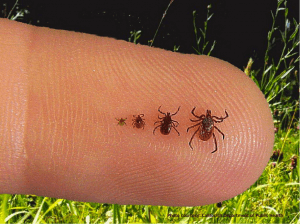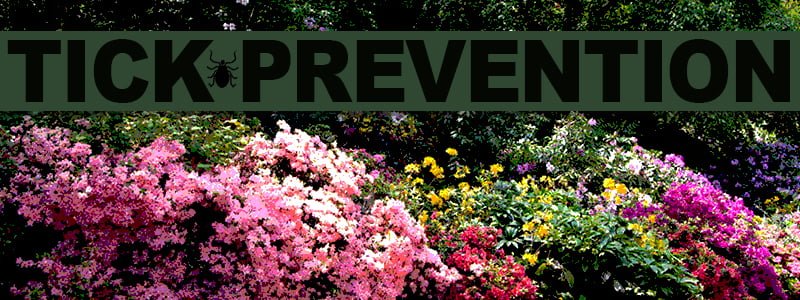Now is the time to start thinking about your plant health care and tick control options. Several counties within the mid-Hudson Valley have the nation’s highest rates of Lyme Disease, making effective tick control methods extremely important.
Lyme Disease is caused by a bite from an infected black-legged tick, more commonly known as a deer tick. Most cases of Lyme Disease come with rashes, bull’s eyes, achy joints, general fatigue and fever. However, in the most serious of cases the effects can be lifelong.
 While there are other ticks that can spread different diseases, Lyme Disease, spread by deer ticks, is the most common and most talked about tick born disease, especially locally. What does remain consistent among these different tick types and the spreading of disease is that these ticks are carried by other animals. Because of this, when putting together your tick control, insect management, and disease management plans, it is important to include methods that help to drive these carriers (deer, forest rodents, etc.) away from your home and plants.
While there are other ticks that can spread different diseases, Lyme Disease, spread by deer ticks, is the most common and most talked about tick born disease, especially locally. What does remain consistent among these different tick types and the spreading of disease is that these ticks are carried by other animals. Because of this, when putting together your tick control, insect management, and disease management plans, it is important to include methods that help to drive these carriers (deer, forest rodents, etc.) away from your home and plants.
The Hudson Valley has a high population of deer. So since they are the primary carriers that help spread the most common tick-born disease, Lyme Disease, what are some methods for deterring deer from your property?
- Repellent Sprays
- Fencing
- Deer Resistant Planting
Often when we say repellent sprays, homeowners fear that the spreading of toxic repellent to your children can be even more dangerous than the presence of pests like ticks and mosquitos. We understand this very real concern, and because of that, we make sure to use the most organic and non-toxic insect and pest applications available. It is part of our overall plant health care strategy to ask ourselves prior to any application on a client’s home if we would use this on our own home and around our own children. If our answer is yes, then we can feel confident in the solution’s effectiveness and safety.
 Fencing your backyard in is of course a great way to avoid the presence of deer. It is important to make sure that this fence is a proper height, and does not have large gaps to effectively keep the deer out.
Fencing your backyard in is of course a great way to avoid the presence of deer. It is important to make sure that this fence is a proper height, and does not have large gaps to effectively keep the deer out.
There are also certain trees that serve as natural deer repellant because of their smell, texture, or they are poisonous. Trees like Black Locust, Cedar, False Cypress, Ginkgo, Hackberry, Japanese Maple, Oak Trees, Magnolia Trees, and many more can be classified as “deer-resistant” trees. Additionally, there are several shrubs and plants that help to deter deer. We can help provide you with a comprehensive consultation for your deer resistant planting plan!
Not only are these pests potentially harmful to your family, and pets, but they spell trouble for your plants. When a rodent, deer, or any other carrier comes through your property transporting a tick, the tick will likely crawl off the carrier while they are eating. This means right into your plants, landscape, and lawn. At this point, these carrier pests are not only ruining your plant life by nibbling at it, but they are also leaving behind an even bigger threat (the tick).
The best way to protect your plants, shrubs, trees, and family from potentially devastating pests, is to have the proper maintenance and diagnosis plan in place. Like illness diagnosis within humans, the earlier you detect any trouble in your plant life, the greater the survival rate of your plant and the larger opportunity to beat the invader completely.
After investing so much time in your plant health and the landscaping on your property, a single insect carrying a disease can wipe your plant life out completely in just a few months. At Red Cedar, we are extremely invested in providing landscape management, tick control, and plant health care plans to help proactively avoid this.
Are you imagining a property full of beautiful and healthy landscape free of dangerous and frustrating pests? Let us help you properly diagnose and put together an effective and safe tick control and plant health care management plan for your property today!


